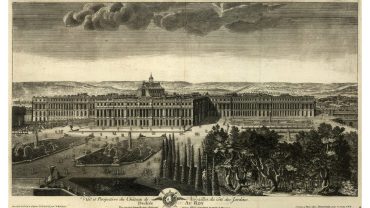The move from Middle to Modern English markedly and irrevocably altered the sound of the English language.
Known as the Great Vowel Shift or the Medieval Vowel Shift, it was not a single event, but a gradual series of changes occurring over the course of several centuries and centred on London and England’s South East.
As the name implies, the vowel shift in the English language mostly affected the pronunciations of vowels, but its impact was much more far reaching.
What Was “The Great Vowel Shift”?

From Chaucer to Shakespeare and beyond, the English language is constantly changing. (Photo: KatSnowden via iStock)
In the early 20th century, Danish linguist Otto Jespersen (1860 – 1943) coined the term “The Great Vowel Shift” to describe the move from Middle to Modern English. He observed that between the 15th and 18th centuries, this process led to striking changes in pronunciation and especially “a general raising of all long vowels”.
Jespersen’s work opened up a conversation about this Medieval Vowel Shift. Yet, despite the idea itself being well received, scholars could not agree on how or even when the Great Vowel Shift occurred. For example, the University of Oslo’s Gjertrud Flermoen Stenbrenden argues that the shift happened over a much longer timeline, perhaps from as early as the mid-11th Century, and that it occurred in eight stages. Others argue that the main shift in the English language occurred in the 15th and 16th centuries. The debate continues to this day.
So, why is there controversy on this matter? How did the Great Vowel Shift change the English language? And why did it happen?
What was the Effect of The Great Vowel Shift?

Alphabet letters (Photo: hannahgleg via iStock)
The first step in exploring the effects of the Great Vowel Shift is to identify the distinctions between Middle and Modern English. The main change was a shortening of long vowel sounds. Take, for example, the Modern English words “bite”, “to”, “meet”, “mouse” and “wife”. Before the shift, these would have been pronounced as “beet”, “toe”, “mate”, “moos” and “weef” respectively.
What’s more, the emphasis on vowels in the name “The Great Vowel Shift” does not totally reflect the changes it heralded. For one thing, not all vowels were affected. Short vowels remained largely unchanged.
What is more, some consonants also underwent alteration, becoming simplified or silent as a result, notably in words such as “enough” and “knight”.
From Chaucer to Shakespeare

A Shakespearian novel (Photo: n_prause via iStock)
One of the most oft-cited comparisons between Middle and Modern English is between the works of Chaucer (1340-1400) and Shakespeare (1585–1613). Not only are they amongst the most celebrated writers in the English language, but they are separated by roughly the same time period as the medieval vowel shift.
In 2006, author Nicholas Brealey highlighted this difference in reference to the respective pronunciations of the words “food”, “good” and “blood”. In Chaucer’s time they would have rhymed with “goad”. The three words still rhymed in Shakespeare’s time, but not as before. Instead, they sounded like we pronounce the word “food” today. Of course, “good” and “blood” have since changed again, their vowels now even shorter.
The Weird Spelling Effect

An old printing press (Photo: dja65 via iStock)
Rather than an example of an effect of the Great Vowel Shift, English spellings are something of a casualty. For, while the spoken sound of the language changed, many spellings were left behind, continuing to reflect Middle English.
Demonstrations of this can be seen in returning to the words “enough” and “knight”. The “k” in knight would have been pronounced pre-shift, while the “gh” would have sounded like the guttural “ch” in “loch”.
To quote Dr Chris Strelluf of Warwick University, “As a rule of thumb, if a spelling is weird, it’s probably because English pronunciation changed.”
So, why were spellings not updated to reflect changing vowels? According to linguists such as Denham and Lobeck (2010), the reason may be traced back to 1476. This was the year William Caxton introduced the first mechanised printing press to England, allowing mass publication of written works. At this time, pronunciation was still very much mid-shift, but printers still used the spellings they had previously established. The theory goes that, by the time dialects had settled in the 17th century, the sheer volume of books already in circulation with pre-shift spellings proved too big a hurdle to overcome.
Exceptions to the Rule
As with any general rule, the Great Vowel Shift did have exceptions. Some Middle English pronunciation stubbornly remained, including “swear”, “father” and “room”. In the realm of spellings meanwhile, many French words, such as soufflé, retained theirs.
The Causes of the Great Vowel Shift
The consensus amongst scholars appears to be that there is no consensus as to the causes of the Great Vowel Shift in the English language. There are a great deal of theories however, some complimentary, some conflicting.
Turmoil
The issue is muddied by the great political and social upheaval that coincided with the Medieval Vowel Shift. The 14th century marked the beginning of the Hundred Years’ War between England and France. In England, the aristocracy were only just in the process of switching from French to English as their main language, a process the monarchy would not complete until the 15th century.
Meanwhile, the Bubonic Plague killed up to 60% of England’s population, sparking mass migration.
Mass Migration
It is the Black Death and the migration that occurred in England in its wake that most count as a major inciting factor in the shift. With London and the South East being the main destinations of migrants, these areas suddenly became home to a myriad of accents and dialects from all over the country. Perhaps there was a certain amount of intermingling and homogenisation of speech. Many linguists argue that pre-migration Londoners changed their vowel pronunciations in order to differentiate themselves from newcomers. From there, whatever new speech patterns emerged proliferated to the rest of the nation.
Social Mobility
Mass migration may have had another tangential effect, blurring the lines of social class and allowing for more social mobility. The ways in which this might have accelerated the Great Vowel Shift may have been two fold. First, it might have resulted in smudging the differences between the accents of different classes. And, if that happened, the upper echelons may have exaggerated – or “hypercorrected” – their enunciation to stand out from the ‘classes’.
The French Influence
The French language is also thought to have played a big role in the shift, but the nature of its impact is disputed. At the time, the English and French languages were closely linked. The aristocracy had begun the process of switching from French to English, but it was still the language of the King and his court until the end of the 14th century. What’s more, Millwards and Hayes (2011) point to the increase of French loanwords at this time.
As to the effect the closeness of the languages might have had on pronunciation, there is a distinct split in academic theory. There seems to be agreement that it probably led to hypercorrection. But while some argue English pronunciation became closer to French, others believe it incited a determined departure.
Perhaps the association of the upper classes with French made it appealing to the middle classes, leading to a sort of emulation. Conversely, maybe the war with France meant a departure due to anti-French sentiments.
Dramatic Change
Whatever the cause of the Medieval Vowel Shift, it led to a dramatic change in pronunciation, spelling and even the use of letters. This vowel shift in the English language can best be felt through the works of great writers and has very much left its mark on history.












